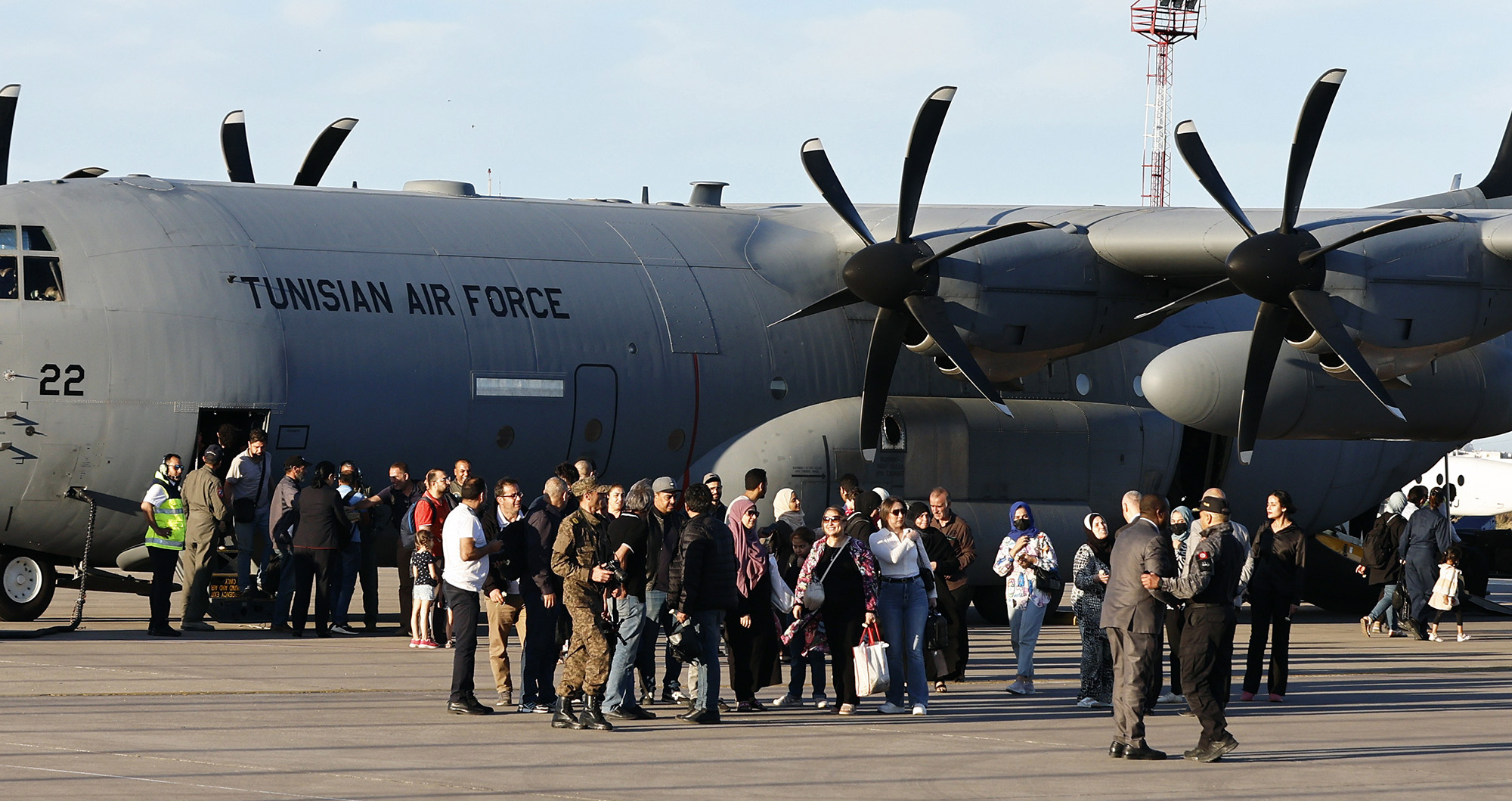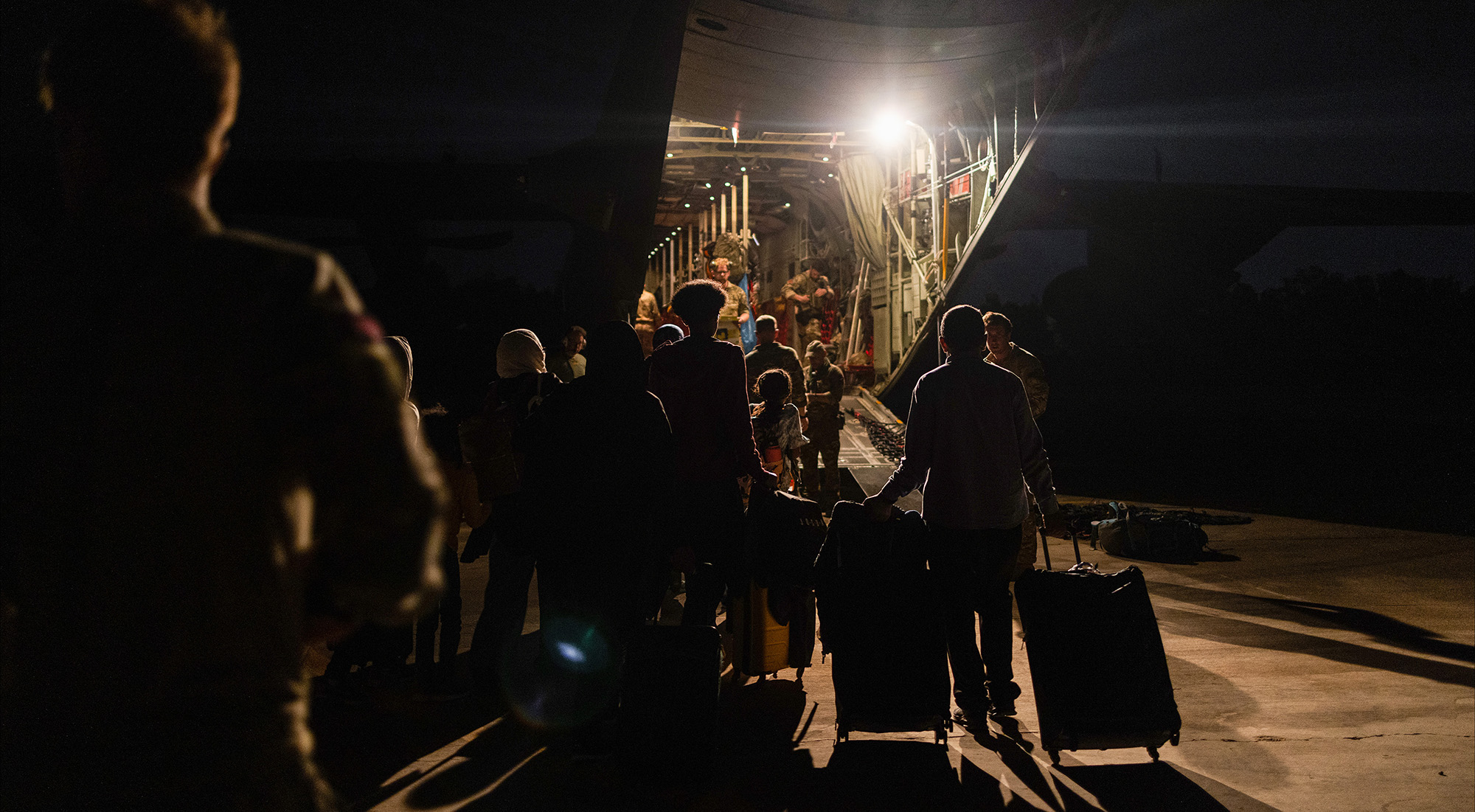Thousands of expatriates, with the help of their governments, headed for the exits this week, bringing terrifying stories of being trapped in the middle of urban warfare in Sudan’s capital, Khartoum.
Tens of thousands of Sudanese refugees poured over the borders into Chad, South Sudan, Egypt and Ethiopia, or reached Port Sudan to get out by sea, or fled into the countryside.
But it is those left behind that we should be most concerned about. The Red Cross termed the situation for civilians in Khartoum, where water and food are running out, “untenable”, and the sudden displacement of so many people has set the scene for a humanitarian disaster.
The efforts to broker peace — from the US, the AU, the Arab League and the UN — are intense but the reality is that the decks have been cleared for a showdown between the forces of the warlords Abdel Fattah al-Burhan and Mohamed Hamdan Dagalo (aka Hemedti).
 Tunisians, who were evacuated from Sudan in a military cargo plane, arrive at Tunis-Carthage International Airport in Tunis, Tunisia, 26 April 2023. (Photo: EPA-EFE / Mohamed Messara)
Tunisians, who were evacuated from Sudan in a military cargo plane, arrive at Tunis-Carthage International Airport in Tunis, Tunisia, 26 April 2023. (Photo: EPA-EFE / Mohamed Messara)
Sudan is now entering uncharted territory. It is not clear how this ends. The country has known coups before and has been under military rule for much of its history since independence from Britain in 1956.
But this is the first time that two groups, armed to the teeth, of almost equal strength, composed of radically different people from different ends of the country, have faced off, which explains the intensity of the violence.
For almost two weeks, Khartoum and parts of the hinterland, including Darfur, have been at the mercy of psychopathic killers. Burhan’s jets have bombed and strafed the suburbs and central business district of his own capital city. Witnesses have seen Hemedti’s Rapid Support Forces (RSF) fighters randomly executing street children.
Prisons have been attacked and thousands of criminals released on to the streets. Ahmed Haroun, the “Butcher of Nuba”, who is facing charges of war crimes and crimes against humanity at the International Criminal Court, was one of those freed from Kobar Prison.
The international community has once again proved wholly unable to read the flashing red signs and to anticipate the pending breakdown.
International players reluctant to step in
There have been warnings of the threat of foreign powers intervening, but the real danger is the reluctance of international and regional players to step into Sudan, largely abandoning the millions of people for whom the crisis has just begun to their fate.
Those countries that have been manoeuvring for spoils in Sudan are in no rush to take advantage of the situation because it is almost impossible to bet on a winner. No one wants to jump into the middle of a civil war.
The US and the West have taken flak for naively believing that the generals were sincere in negotiating for a civilian government even when it was clear that they had no interest in peace.
“To the western negotiators: you put us in this mess & now you’re swooping in to take your kinfolk (the ones that matter) & leaving us behind,” Khartoum resident Dallia Mohamed Abdelmoniem tweeted. “God have mercy on us cause no one else gives a damn and no one else will be merciful.”
In a striking self-critique Jeffrey Feltman, the former US special envoy to Sudan, said: “We avoided exacting consequences for repeated acts of impunity that might have otherwise forced a change in calculus. Instead, we reflexively appeased and accommodated the two warlords. We considered ourselves pragmatic.”
The Frankenstein monster of the RSF was given life by the former Sudanese leader Omar al-Bashir who used Hemedti to break the power of Musa al-Hilal, the leader of the Janjaweed “Arab” tribes that had perpetrated ethnic cleansing against the “Africans” in Darfur.
Hemedti took over most of the Janjaweed tribes and participated in the anti-Islamist coup against Bashir in 2019.
Lure of gold
Hemedti is a gifted entrepreneur of war with an ability to operate across borders, a skill that he blended with multiple business interests, most notably the portions of the gold industry that have earned his enterprises billions of dollars. Sudanese gold production has exploded in the past six years and the country has overtaken South Africa to become the second-largest producer on the continent after Ghana.
Hemedti’s militia was boosted by the United Arab Emirates, which deployed RSF soldiers as proxy fighters to further its foreign policy objectives in Yemen and Libya rather than sending in its own army.
The RSF today has grown to number 120,000, which would make it the sixth-largest standing army in Africa.
The UAE has invested billions of dollars in Sudan and was one of the countries, including the UK, the US, Norway and Saudi Arabia, that negotiated a political deal between the civilians and the military after the overthrow of Bashir and later the coup of October 2021. But now Mohamed bin Zayed Al Nahyan, the president of the UAE, is staying well away from a fight over which he has no control.
The Russians also have no incentive to stick their nose into the mess. Foreign Minister Sergey Lavrov has been to Khartoum twice this year, arriving two days before the outbreak of violence. Russia’s prime objective, the establishment of a naval base on the Red Sea, can be agreed with whoever emerges at the other end.
Wagner group
The Wagner mercenary group is a different story. After their collaboration with the RSF in Libya in support of the rebel General Khalifa Haftar, they forged close links with Hemedti who was already selling his gold ingots to Moscow. Some Wagners posted to the Central African Republic (CAR) filtered up to Darfur where they have been panhandling gold in the streams coming down from the Marrah Mountains.
Hemedti also collaborated with the Bangui-based Wagners and there was a growing alignment between the two enterprises, both of which straddle shadowy state power, war-making and commerce.
Earlier this year, about 500 RSF forces crossed the CAR border and alongside Wagner fought and defeated two militias to secure a diamond mine in the Vakanga area of the CAR.
There has been no hard evidence of Wagner’s involvement in military action in Sudan. Nor is there evidence of arms shipment from the Russians to either side.
The rest of the region, with the exception of Egypt, which backs Burhan but does not have the means to do much about it, is staying out — for now, anyway.
The much-touted help for the RSF from Haftar in Libya is either very limited or non-existent.
Without an extended peace implemented by the international community or a victory for one side, Sudan could degenerate into what Somalia became in the 1990s — an open sore in the region.
Media spotlight
Some hope springs from the amount of media attention that the crisis in Sudan has received, led by the brilliant reporting of Declan Walsh of The New York Times. This contrasts with the war in Ethiopia, where hundreds of thousands of people were killed almost entirely out of public view and media organisations were generally uninterested.
Might this spotlight instil a greater sense of purpose in the international community?
No doubt the task of building peace is massive and grows more complicated the longer the fighting continues. If Sudan disintegrates, there are other armed groups, such as the SPLM-North from the Nuba Mountains in the centre of the country, that could join the melee.
The schism between the two militaries goes deeper than a rivalry between two generals. Hemedti is an outsider to the Khartoum establishment and his fighters are Darfur Arabs from the far west — the “children of the west”.
Alex de Waal, executive director of the World Peace Foundation, has described the rise of Hemedti and his “vagabond” militia as “the revenge of the historically marginalised”.
Looked at this way, they are like the barbarians that have come to sack Rome.
The Roman Empire broke down in the fifth century and everybody was at each other’s throats. Let’s hope that Sudan is not about to enter another Dark Age. DM
Phillip Van Niekerk is the editor of Africa Unscrambled, a newsletter covering the continent in a way you won’t read anywhere else. Get unscrambled by signing up right here.




 Tunisians, who were evacuated from Sudan in a military cargo plane, arrive at Tunis-Carthage International Airport in Tunis, Tunisia, 26 April 2023. (Photo: EPA-EFE / Mohamed Messara)
Tunisians, who were evacuated from Sudan in a military cargo plane, arrive at Tunis-Carthage International Airport in Tunis, Tunisia, 26 April 2023. (Photo: EPA-EFE / Mohamed Messara)